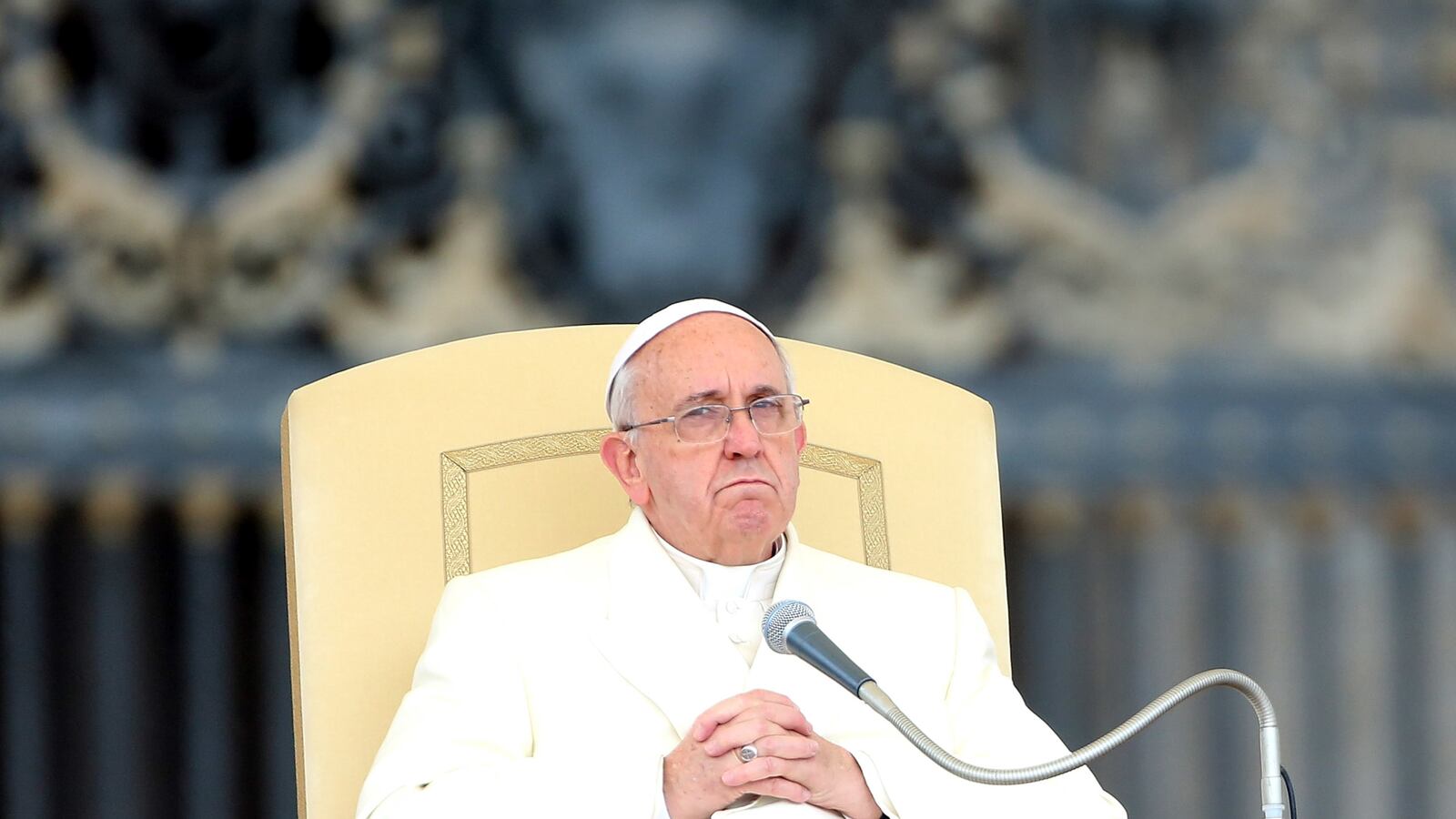Investment bankers are cashing bonus checks this month. Let’s hope that cheers them up after their rough year: hedge fund titans are under increasing scrutiny, Americans are railing about inequality, and my old employer, JP Morgan, has incurred multi-billion dollar legal settlements. Heck, even the Pope is piling on, warning against greed as a “new idolatry.”
As a onetime banker and former Jesuit seminarian, I can help! No, not to defray those legal bills, but to defrost the Pope’s relationship with Wall St. I want to propose a sit-down between Pope Francis and top bankers: he could help them reform their counter-productive, hierarchical title structure; they could help him monetize the Vatican’s underleveraged assets.
The Pope has already reformed Catholicism’s title regime by essentially eliminating the “monsignor” title for priests under the age of 65. That may seem a ho-hum initiative to outsiders, hardly packing the headline-grabbing punch of, say, a decision to ordain women as priests (don’t hold your breath for that one).
But it’s a bold stroke. The monsignor title has been around for centuries, for even longer than Goldman Sachs has existed. The honorific is akin to addressing someone as, “My lord,” which is the literal meaning of the French root, mon seigneur. No wonder Pope Francis, champion of humility and simplicity of lifestyle as worthy human virtues, would do away with it.
The title won’t be missed by most clerics, humble men who joined the priesthood to serve, not to seek status and wealth. But a few young clerics invariably become infected with the careerist bug and are undoubtedly crestfallen that the Pope has yanked the monsignor rung from the hierarchical ladder. After all, there are 400,000 priests; only 5,000 or so ever become bishops. Hierarchical promotion is therefore a real long shot, and some careerists surely enjoyed being called “monsignor” while hoping for the next step upwards; a few even took pride in the purple or red trim they could add to their cassocks. Not that the Pope will worry about these disgruntled few: he has railed against clerical careerism multiple times, calling it a “leprosy.”
That same “leprosy”—the self-absorbed preoccupation with status and advancement—afflicts every institution, and the Pope’s initiative brought to mind a sorry episode in my investment banking career. An associate stormed my office one bonus day afternoon. I had seen her earlier that day, and she was beaming about her bonus. She had received more money that afternoon than her hard-working parents earned all year; her bonus exceeded the nation’s median salary. (I know that bankers generally measure their bonuses against the GDPs of small countries, not against median salaries, but she labored in the relative penury of a support function.)
But her bonus joy was fleeting, and now she was irate. Through choking sobs, she denounced my injustice of promoting her colleague to Vice President and not her; never mind even a passing pretense of graciousness about her friend’s promotion or gratitude for her own generous pay.
This wasn’t the first time someone cried in my office over a missed title promotion. We managers wasted colossal amounts of corporate time dealing with complaints that had nothing to do with justice or job effectiveness and everything to do with ego-stroking and personal status. In an increasingly complex, globalized world, success in our industry depended heavily on dedicated cross-functional collaboration. Yet the title system and outsized bonuses sometimes promoted exactly the opposite: envy, personal rivalries, utter self-absorption, placing personal gain ahead of team mission, and an unseemly instinct to hog credit for success rather than sharing it. The industry has yet to solve this fundamental cultural challenge.
Halfway through my Morgan career, our corporate management got fed up with it all and flattened our title structure from five rungs to three in one bold stroke, much as the Pope stripped away the monsignor title. I can’t calculate the time saved and productivity gained from that one initiative. To be sure, bankers were outraged at first. Not that they cared about themselves, they adamantly protested, but the clients won’t understand. The clients.
Yeah, right. I remember explaining the change to one CFO of a Midwestern manufacturer. He only chortled, “Heck, we don’t pay any attention to your crazy titles. You all seem to be at least Vice Presidents anyway, and everyone seems to be co-head of something or other.” (Not that he was qualified to offer an opinion: he didn’t even wear cufflinks, and his ties were often tainted by a touch of polyester).
In the years since I’ve left investment banking, I’ve noticed the title rungs creep back in. My beloved JP Morgan added the title of Executive Director. Managing this circus is undoubtedly a headache. That’s why I propose a sit-down between the Pope’s team and banking executives. The Pope could explain how he simplified his title structure. If the bankers don’t like that idea, maybe Pope Francis could let them use the monsignor title that he is discarding, adding yet another ornamental bauble to banking’s hierarchical Christmas tree. Heck, he could even let the banking dandies complement their power suits with some of that monsignorial purple piping that will otherwise go to waste in clerical warehouses.
Once the relationship warms up, the bankers could explain the free market’s virtues to the Pope. Indeed, they could help him monetize his woefully under-leveraged assets, like Michelangelo’s Pieta. Sure, that masterpiece may challenge one to ponder whether life ought to be devoted to self-sacrificial service of the common good rather than self-absorbed pursuit of status, money, and power. But inspiring the heart doesn’t pay the bills. Collateralized Vatican Obligations, anyone?
[Chris Lowney, formerly a Managing Director of JP Morgan & Co, is author of Pope Francis: Why He Leads the Way He Leads]






